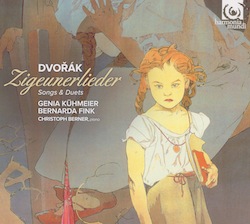
Antonin Dvořák’s songs for voice and piano, although dwarfed in reputation by his other works, are rich in beguiling melodies and charming sentiments. They’re not heavyweights by any means; not even the 10 Biblical Songs Op. 99, settings of verses from the Psalms of David in their “free” Czech translation, approach the spiritual profundity of Brahms’ Four Serious Songs or much of Schubert’s output. But, treated well, they have the power to move the listener, or at least transport them to a place far from this time.
Why then, I asked myself, am I doing anything but sitting still as soprano Genia Kühmeier performs the seven Gypsy Melodies, Op. 55; she and mezzo-soprano Bernarda Fink harmonize and blend beautifully in the 13 Moravian Duets, Op. 32; and Fink sings gloriously in the Biblical Songs, Op. 99? What lover of the voice cannot appreciate Kühmeier’s lyric beauty in “A les je tichy kolem kol” (And the forest is silent all around), the third of the Gypsy Melodies. How about the adorable, wonderful interplay of the two vocal lines and the refreshingly innocent sentiments in “A já ti uplynu” (I will escape you), the first of the Moravian Duets? Just savor the moving, charged emotion of “Oblak a mrákota jest vûkol Neho” (Clouds and Darkness are round about him), the first of the Biblical Songs, and pianist Christoph Berner’s delicate and moving accompaniment in the third song. Why is all of this consummate musicianship failing to seize me and draw me in?
Certainly the vocalism itself cannot be faulted. Kühmeier has a lovely, bright voice with a clear edge and winning tone, and Fink’s singing is, in much of her work, ravishing. Her voice in “Hospodin jest müj pastyr” (The Lord is my shepherd) is the epitome of warmth and health. The sound is open and free, and every note is pious and sincere. You could wrap yourself in Fink’s blanket of warm sound and purr like a kitten on a perfect afternoon.
Yet more is wanting. Kühmeier’s gypsies are the loveliest, most refined bunch you’ll ever encounter, either in song or in person. They play their triangles, tune their strings, dance around, and celebrate their freedom with a civilized restraint that would make them a welcome addition to any a Lady’s Club luncheon entertainment. The wildness that distinguishes the opening of soprano Karita Mattila’s live rendition in Helsinki in 2006 has been sanitized beyond recognition.
One listen to the three Biblical Songs that soprano Gabriela Benacková recorded with Rudolf Firkušný in 1991 reveals what’s missing from Fink’s performance. Singing in her native language, Benacková sings each of her songs considerably slower, thereby infusing them with a greater air of profundity. The sentiments, simply put, are more believable.
I regret that my collection lacks the famed rendition of the Moravian Duets by sopranos Elisabeth Schwarzkopf and Irmgard Seefried. You can’t even find them on YouTube! Yet, even without hearing them, I’ll wager a bet that Schwarzkopf is far coyer, and the duets juicier, than Kühmeier and Fink's effort. Any way you look at it, Gypsies + Ivory Soap = Respectful Ennui.

